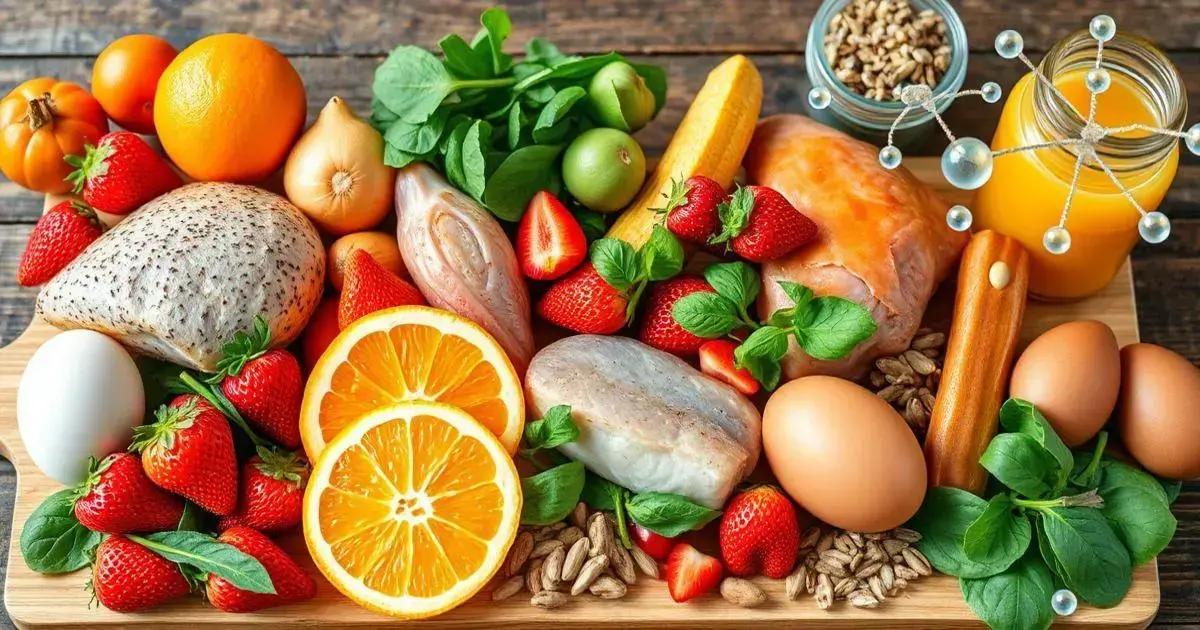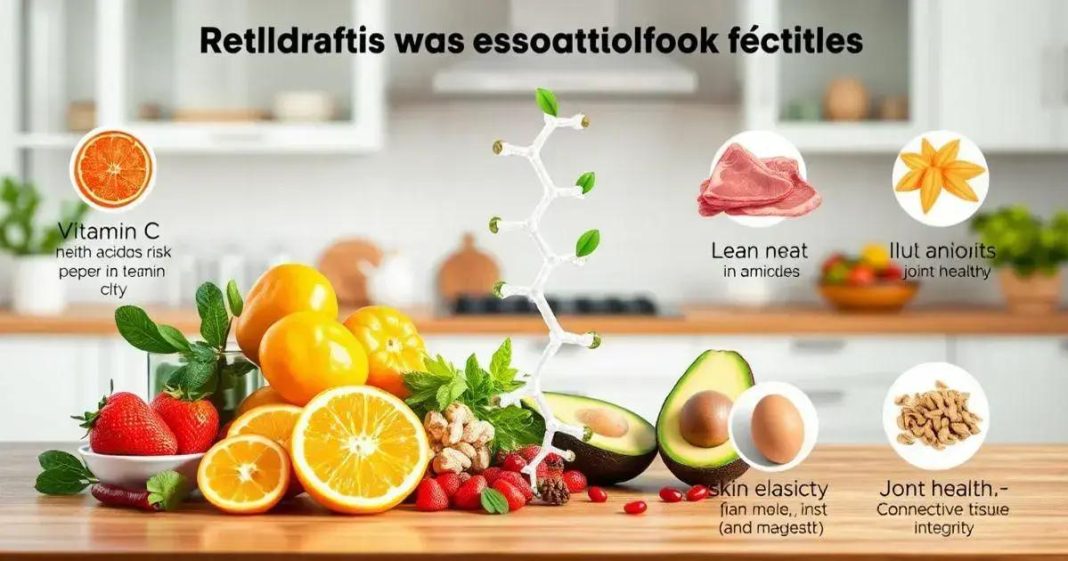To enhance collagen absorption from supplements, pair them with vitamin C-rich foods, consume alongside protein sources, and stay hydrated. Opt for hydrolyzed collagen for better bioavailability, and consider taking it on an empty stomach. Additionally, limit sugar intake to prevent damage to collagen and improve its effectiveness, ensuring optimal support for skin, joints, and overall health.
Collagen nutrients play a vital role in the synthesis and maintenance of collagen in the body. Collagen is the most abundant protein, critical for skin elasticity, joint health, and the structural integrity of connective tissues. To support collagen production, it is essential to understand which nutrients contribute to its synthesis and overall health.
This article will explore the key nutrients that enhance collagen production and how to incorporate them into your diet for optimal health benefits.
What is Collagen?
Collagen is the most abundant protein in the human body, constituting approximately 30% of its total protein content. It serves as a crucial structural component in various tissues, including skin, bones, muscles, tendons, and cartilage. Collagen provides strength, support, and elasticity, playing a pivotal role in maintaining the integrity and functionality of these tissues.
There are several types of collagen, with types I, II, and III being the most prevalent:
- Type I Collagen: This type is primarily found in skin, bones, and tendons, providing tensile strength and structural support.
- Type II Collagen: Predominantly located in cartilage, Type II collagen is essential for joint health, helping to maintain the resilience and flexibility of cartilage.
- Type III Collagen: Often found alongside type I collagen, type III is present in skin and blood vessels, supporting tissue structure and elasticity.
Collagen is naturally produced by the body, but its synthesis decreases with age, leading to common issues such as joint pain, stiffness, and skin aging. This decline underscores the importance of understanding how to support collagen levels through diet, lifestyle, and supplementation.

The Importance of Collagen Nutrients
The importance of collagen nutrients lies in their essential role in supporting the synthesis and maintenance of collagen in the body. These nutrients not only help the body produce collagen but also ensure its structural integrity and functionality across various tissues. Here are some key reasons why collagen nutrients are vital:
- Facilitate Collagen Synthesis: Nutrients such as vitamin C, proline, and glycine are critical for the formation of collagen. Vitamin C, in particular, is necessary for the hydroxylation of proline and lysine, amino acids that are integral to collagen structure.
- Support Skin Health: Collagen nutrients help maintain skin elasticity and hydration, reducing the appearance of wrinkles and promoting a youthful complexion. A proper supply of these nutrients is crucial for skin repair and regeneration.
- Enhance Joint Function: Nutrients like glucosamine and chondroitin support cartilage health, which is essential for joint function. These nutrients can help alleviate joint pain and improve mobility.
- Promote Bone Strength: Calcium, vitamin D, and magnesium are important nutrients that support bone health and work synergistically with collagen to maintain bone density and strength.
- Improve Muscle Recovery: Amino acids, particularly glycine and proline, are vital for muscle repair and recovery. Collagen nutrients can support muscle health, especially after physical activity.
- Boost Overall Health: Collagen nutrients contribute to the proper functioning of various systems in the body, including the immune system, digestive system, and cardiovascular health, promoting overall vitality.
In summary, ensuring an adequate intake of collagen nutrients through diet and supplementation is essential for maintaining collagen levels and supporting overall health. Incorporating a variety of nutrient-dense foods can help optimize collagen production and enhance well-being.
Key Nutrients for Collagen Production
To effectively support collagen production in the body, it’s essential to consume certain key nutrients that play a vital role in its synthesis. Here are some of the most important nutrients for collagen production:
- Vitamin C: This vitamin is crucial for collagen synthesis, as it helps stabilize the collagen molecule and is necessary for the hydroxylation of proline and lysine, two amino acids essential for collagen structure. Foods rich in vitamin C include citrus fruits, strawberries, bell peppers, and leafy greens.
- Proline: An amino acid that is a significant component of collagen. Proline is found in high concentrations in animal products, such as meat, eggs, and dairy. It can also be found in smaller amounts in some plant-based foods like cabbage and soy.
- Glycine: Another amino acid that is abundant in collagen. Glycine can be found in protein-rich foods, such as meat, fish, dairy, and legumes. It plays a vital role in collagen formation and overall health.
- Copper: This mineral is essential for the formation of elastin and collagen. It helps cross-link collagen fibers, contributing to the strength and stability of connective tissues. Good sources of copper include shellfish, seeds, nuts, whole grains, and dark chocolate.
- Zinc: Zinc is important for collagen synthesis and helps with tissue repair and regeneration. It can be found in foods such as meat, shellfish, legumes, seeds, nuts, and whole grains.
- Omega-3 Fatty Acids: While not directly involved in collagen synthesis, omega-3 fatty acids have anti-inflammatory properties that can help maintain healthy skin and joints, which supports the overall function of collagen in the body. Sources include fatty fish, flaxseeds, and walnuts.
By incorporating these key nutrients into your diet, you can effectively support your body’s collagen production, promoting healthier skin, joints, and connective tissues. A balanced diet rich in whole foods is essential for optimal collagen synthesis and overall health.

Foods Rich in Collagen Nutrients
Incorporating foods rich in collagen nutrients into your diet can significantly enhance your body’s ability to produce and maintain collagen levels. Here are some key foods that can help boost collagen production:
- Bone Broth: Made by simmering animal bones and connective tissues, bone broth is one of the richest sources of collagen. It provides amino acids like glycine and proline, which are essential for collagen synthesis.
- Chicken: Chicken, particularly its skin and cartilage, is a great source of collagen. Consuming chicken can help support your collagen intake effectively.
- Fish: Fish, especially those with skin (like salmon and mackerel), is rich in collagen and omega-3 fatty acids, which promote joint health and skin hydration.
- Eggs: Egg whites are packed with proline, an important amino acid for collagen production. Incorporating eggs into your diet can help boost your collagen levels.
- Leafy Greens: Vegetables like spinach, kale, and Swiss chard are high in chlorophyll, which has been shown to increase collagen levels in the skin.
- Berries: Berries such as strawberries, blueberries, and blackberries are rich in vitamin C, an essential nutrient for collagen synthesis and an antioxidant that helps protect collagen from damage.
- Citrus Fruits: Fruits like oranges, lemons, and grapefruits are excellent sources of vitamin C, which is vital for collagen production and skin health.
- Nuts and Seeds: Nuts and seeds, especially almonds and sunflower seeds, provide healthy fats, vitamin E, and zinc, all of which support skin and collagen health.
- Beans: Beans are a good source of protein and contain amino acids that are necessary for collagen synthesis. They also provide additional nutrients that support overall skin and joint health.
By incorporating these collagen-rich foods into your diet, you can naturally enhance your collagen levels, supporting healthier skin, joints, and overall wellness. A balanced diet combined with good hydration is essential for optimal collagen production.
How to Enhance Collagen Absorption
Enhancing collagen absorption is essential for maximizing the benefits of collagen supplements and ensuring your body effectively utilizes this vital protein. Here are some strategies to improve collagen absorption:
- Pair with Vitamin C: Vitamin C is crucial for collagen synthesis and helps stabilize the collagen molecule. Consuming collagen supplements alongside vitamin C-rich foods, such as citrus fruits, strawberries, and bell peppers, can enhance absorption and effectiveness.
- Consume with Protein: Taking collagen with other protein sources can improve overall amino acid availability, supporting collagen synthesis. Foods such as chicken, fish, eggs, and legumes can complement collagen intake.
- Hydrate Well: Staying well-hydrated is important for overall nutrient absorption, including collagen. Drink plenty of water throughout the day to support optimal digestion and absorption of collagen supplements.
- Avoid Excessive Sugar: High sugar intake can lead to the formation of advanced glycation end products (AGEs), which can damage collagen and reduce its effectiveness. Limiting sugar consumption can help protect collagen levels.
- Consider the Form of Collagen: Hydrolyzed collagen (collagen peptides) is more easily absorbed than other forms. Choose supplements that use hydrolyzed collagen for better bioavailability.
- Take on an Empty Stomach: Some studies suggest that taking collagen supplements on an empty stomach may enhance absorption. Consider taking them first thing in the morning before meals.
By implementing these strategies, you can effectively enhance collagen absorption, ensuring that your body can utilize this essential protein to support skin, joint, and overall health. As always, consult with a healthcare professional before starting any new supplement regimen.
Conclusion
In conclusion, enhancing collagen absorption is vital for maximizing the health benefits of collagen supplements.
By pairing collagen with vitamin C-rich foods, consuming it alongside other protein sources, staying well-hydrated, and avoiding excessive sugar, you can improve your body’s ability to utilize this essential protein effectively.
Additionally, choosing hydrolyzed collagen and considering the timing of your supplement intake can further support absorption.
By following these strategies, you can ensure that you are reaping the full benefits of collagen for skin health, joint support, and overall wellness.
As always, it’s important to consult with a healthcare professional before starting any new supplement regimen to ensure it aligns with your individual health needs and goals.
Frequently Asked Questions about Enhancing Collagen Absorption
How can I improve collagen absorption?
You can improve collagen absorption by pairing it with vitamin C-rich foods, consuming it with protein sources, and staying well-hydrated.
Why is vitamin C important for collagen absorption?
Vitamin C is crucial for collagen synthesis and helps stabilize the collagen molecule, enhancing its absorption and effectiveness.
Is it better to take collagen on an empty stomach?
Some studies suggest that taking collagen supplements on an empty stomach may enhance absorption, so consider taking them first thing in the morning.
What form of collagen is best for absorption?
Hydrolyzed collagen (collagen peptides) is more easily absorbed than other forms, so choose supplements that use hydrolyzed collagen.
Does sugar affect collagen absorption?
Yes, excessive sugar intake can lead to the formation of advanced glycation end products (AGEs), which can damage collagen and reduce its effectiveness.
Should I combine collagen supplements with other foods?
Yes, combining collagen supplements with protein sources and vitamin C-rich foods can enhance overall absorption and utilization in the body.


